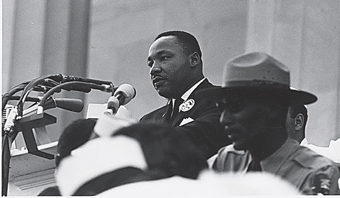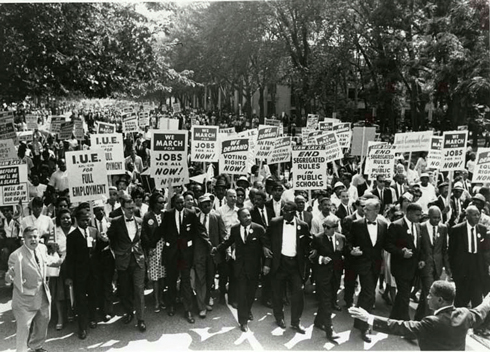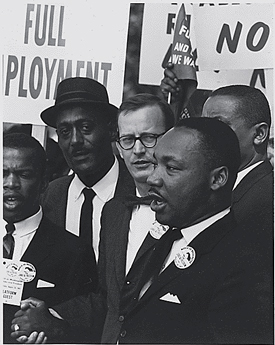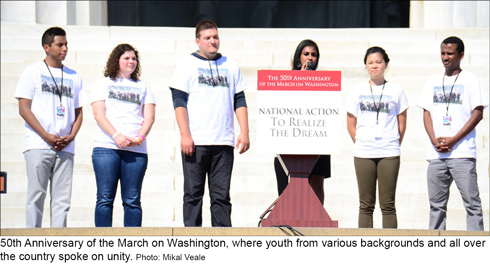Marching on Washington 50 years later
By Charlene Muhammad -National Correspondent- | Last updated: Aug 27, 2013 - 10:41:07 AMWhat's your opinion on this article?
We shall overcome— but when and how?

Dr. Martin Luther King Jr. delivers his famous “I Have a Dream” speech at the Civil Rights March on Washington, D.C. 08/28/1963 Photo: Flickr
|
Now that the March is over, Blacks must take multiple routes to achieve actual progress in America, according to the economists. And a top priority should be poverty, stated Dr. Julianne Malveaux, also an author, commentator and former president of Bennett College for Women.
“I would be an idiot to say there has been no progress but I want us to look at the bottom as well as the top. Poverty has become a bad word in America. We don’t even use the word poverty very much anymore and yet, it’s poverty that’s our scourge,” she told The Final Call.
Dr. King always looked at the bottom, Dr. Malveaux said.
“People want to talk about he had a dream, but he wasn’t sleeping! It wasn’t like a dream he had when he closed his eyes at night. His dream became something of an actuality,” she noted.
She reflected that he was killed while helping to organize sanitation workers in Memphis, Tennessee, who had been so discriminated against. She drew a parallel between their struggle and fast food workers’current fight for increased wages and union rights. When they walk out on strike on August 29, she believes Dr. King would have been in front of them, she said.

Historic March on Washington 1963, led by Dr. Martin Luther King Jr. Photo: Flickr
|
But the original Civil Rights Movement and the March were authentic representatives of the poor, said Cedric Muhammad, CEO of CM Cap and the Eclectic Economist Blog.
They were either poor themselves, or represented the poor communities that they came from, even if they were more wealthy, educated intellectuals, he said. The original Civil Rights leaders felt for the poor and they sought to speak for and understand them.
“But what has happened is the Civil Rights Movement has been co-opted and absorbed by political parties. And so the political party by nature of its function is seek the middle, so you will always hear politicians speaking for the middle class as opposed to the poor,” Cedric Muhammad stated.
In retrospect, Blacks’ normal segregated and separated experience had some benefits to it. For instance, they were in more economic unity back then. They owned more land, had more elected officials, and more community development, he said.
But through Civil Rights, the appeal or advertisement was that Blacks were being integrated into a form of membership with the best in civilized society, when really they were being allowed to experience the poor and worst part of that experience, Cedric Muhammad noted.
“We gave up the best part of our negative reality in exchange for greater involvement or engagement with integration into something which really was a declining civilization, so we were integrated into a burning house, which Dr. King feared,” he said.

Dr. Martin Luther King Jr. Photo: Flickr
|
Take the 12 percent of Whites without health insurance today compared to 36 percent of Blacks without it, he said. And that’s just one example he gave of the lingering problems that exist.
“It’s like, just because there were some things that were changed or improved during the Civil Rights era doesn’t mean that all of a sudden we’re talking about a country that has all of a sudden changed its stripes,” Dr. Bositis told The Final Call.
People have asked how could disparities and inequalities still exist in such a progressive country in 2013. But the problem is first of all, America isn’t a progressive country, Dr. Bositis stated.
“The White conservatives in the south have never given up on their efforts to fight the changes that took place during the Civil Rights era. There was progress made in the 60’s and 70’s but then Ron Reagan was elected president and things went backward,” he said.
Then the country started throwing everybody in prison, assaulting affirmative action and labor, and reducing the standard of living for Blacks and other poor people, Dr. Bositis continued. Things began improving again in the 90’s under former president Bill Clinton, but then White southern conservatives regained control after 2001, and thus began a long period of very negative things for Blacks, and periods of progress and regress, he said.
Dr. Bositis said focus coming out of 50th Anniversary March should be on “Moral Monday” protests in North Carolina.
“The Republicans took over the state government in North Carolina. They gutted the unemployment program. They didn’t expand Medicaid that was free from the federal government. They passed a strict voter ID law which was intended to keep minority voters from voting. You name it! They’ve done nothing but bad stuff,” Dr. Bositis said.
And the Civil Rights community there is responding because Black people have no say in North Carolina politics right now, he said, but the future will be different.
“The point is, we’re catching hell,” said Dr. Wilmer Leon, radio host and teaching associate in the Department of Political Science at Howard University.

|
According to Dr. Leon, at the time of the 1963 March for Jobs and Freedom, Black unemployment stood at 8 percent, which was double the national rate at that time of 4 percent. Today, 7.5 percent are unemployed nationally while Black unemployment hovers around 15 percent.
“One would have to conclude from that number that to a great degree things have stayed pretty much the same,” in many areas including mass incarceration and poverty,” Dr. Leon said.
Across the country, from Chicago, Los Angeles to Harlem and in southern cities, too many people are trying to get minimal access to the benefits of this country on all levels.
“So many of us believe that with an African American president that he would do so much for us and that was a huge mistake on a number of levels. We have to move away from focusing on the politics of personality and we have to focus on the politics of policy,” Dr. Leon told The Final Call.
According to Dedrick Muhammad, Sr. Director of the Economic Department and Executive Director of the Financial Freedom Center for the NAACP, it was policies like the 1968 Fair Housing Act, one of the final great Civil Rights victories, that helped to highlight the economic focus of the movement.
It signaled that if Blacks were ever going to bridge racial inequality gaps, they’d have to deal with economics, he said. He also feels the 50th Anniversary of the March on Washington should be a commemoration and a remembrance of the part of Dr. King’s speech referring to a promissory note that returned marked insufficient funds.
“The 1963 March on Washington was a kickoff to more activism and that’s what this anniversary needs to be or in 50 years we’ll still be at the same place, talking about what hasn’t been done,” Dedrick Muhammad said.
INSIDE STORIES AND REVIEWS
-
-
About Harriett ... and the Negro Hollywood Road Show
By Rabiah Muhammad, Guest Columnist » Full Story -
Skepticism greets Jay-Z, NFL talk of inspiring change
By Bryan 18X Crawford and Richard B. Muhammad The Final Call Newspaper @TheFinalCall » Full Story -
The painful problem of Black girls and suicide
By Charlene Muhammad -National Correspondent- » Full Story -
Exploitation of Innocence - Report: Perceptions, policies hurting Black girls
By Charlene Muhammad -National Correspondent- » Full Story -
Big Ballin: Big ideas fuel a father’s Big Baller Brand and brash business sense
By Bryan Crawford -Contributing Writer- » Full Story






 Click Here Stay Connected!
Click Here Stay Connected!








